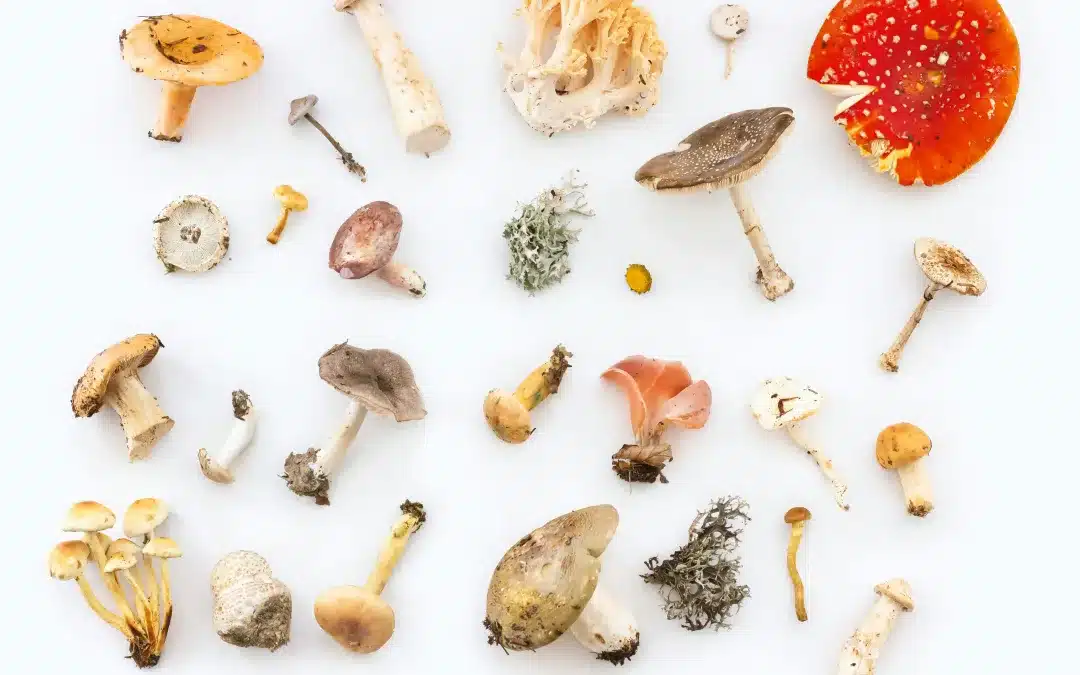In recent years, the world of nutrition has witnessed a resurgence of interest in functional foods that promote overall well-being, with a particular focus on gut health. Among these nutritional powerhouses, mushrooms stand out as a remarkable and versatile option. Beyond their culinary appeal, mushrooms boast an array of health benefits, including their ability to support gut health. Let’s delve into the fascinating relationship between mushrooms and the gut microbiome.
The Role of Edible Mushrooms in Gut Health
Mushrooms, long celebrated for their unique taste and texture, offer a wealth of nutrients and bioactive compounds that can positively influence gut health. These fungi are rich in dietary fiber, vitamins, minerals, and antioxidants, making them a valuable addition to any diet.
One of the most notable components of mushrooms is their prebiotic fiber content. Prebiotics serve as fuel for beneficial gut bacteria, stimulating their growth and activity. By nourishing these microorganisms, prebiotics contribute to a thriving gut microbiome, promoting digestive health and immune function.
Moreover, mushrooms contain an abundance of polysaccharides such as beta-glucans, which exhibit immune-modulating properties. These compounds can help regulate the immune response within the gut, fostering a balanced inflammatory state and supporting the integrity of the intestinal barrier. Research shows that these polysaccharides can stimulate the growth of healthy bacteria [1-4]. While many foods break down with stomach acid, the polysaccharides found in mushrooms pass through the stomach unchanged and can reach the colon to encourage bacteria growth there.
Certain mushroom varieties, such as shiitake, reishi, and maitake, are particularly renowned for their medicinal properties. These mushrooms contain bioactive compounds like polysaccharides, triterpenes, and polyphenols, which possess antioxidant, anti-inflammatory, and antimicrobial effects[1-3]. By incorporating these mushrooms into your diet, you can potentially reduce inflammation, enhance immune function, and protect against gastrointestinal disorders.
Below is a list of several benefits that mushrooms contribute to gut health:
- Prebiotics: Mushrooms are rich in soluble fiber compounds like chitin, hemicellulose, beta-glucans, and others, which are perfect prebiotics. They are essentially food for gut bacteria, which promotes the growth of gut microbiota, and in turn increase gut health! [1,4]
- Fiber: Mushrooms are high in fiber, so not just the soluble fiber feeds the gut bacteria, but the insoluble fiber supports gut health by encouraging regular bowel movements [2-3].
- Vitamin D: mushrooms are the only food we eat that their vitamin D profile is influenced by sunlight exposure. In fact, mushrooms are the only vegetable that delivers substantial vitamin D. Vitamin D gives the intestines cell integrity and strength, providing protection from pathogens [5].
- Immune support: mushrooms, including maitake and reishi, contain compounds that can enhance your immune response [2,3].
- Anti-inflammatory: mushrooms contain antioxidants and anti-inflammatory compounds that can help reduce inflammation [2,3].
- Weight management: certain mushroom varieties, like lion’s main, have been link to improved satiety and reduced appetite, which may support weight management [3].
Most Beneficial Types of Edible Mushrooms for Gut Health
- Reishi mushrooms: A type of edible mushroom known for its medicinal properties, including anti-inflammatory effects and improving immunity. Supplements are the most common way of taking reishi mushrooms. Ganoderma lucidum, one species of reishi mushrooms can increase the population of bifidobacterium, a beneficial probiotic bacteria [1].
- Chaga mushrooms: Medicinal mushrooms most commonly consumed as a tea. Chaga teas are used to treat gastrointestinal disorders, bacterial infections, and viral infections. A particular category of chaga mushrooms, inonotus obliquus, support growth of Bacteroidetes [1].
- Coriolus mushrooms: Rich in fibers that support Bifidobacterium and Lactobacillus bacteria, two of the most prevalent probiotics. This mushroom is commonly known as Turkey Tail and has shown the ability to increase diversity in the gut microbiome of humans [1].
- Maitake mushrooms: Rich in beta-glucans, which can help regulate blood sugar levels and support gut health.
- Lion’s mane mushrooms: May promote the growth of beneficial gut bacteria and reduce inflammation in the digestive tract.
Incorporating Edible Mushrooms into Your Diet
Fortunately, there are numerous ways to enjoy the health benefits of mushrooms. Whether sautéed, grilled, baked, or blended into soups and stews, mushrooms add depth and flavor to a wide range of dishes.
For optimal gut health, aim to include a variety of mushroom species in your diet regularly. Experiment with different cooking methods and recipes to discover new and delicious ways to incorporate mushrooms into your meals. Whether you prefer the earthy richness of portobello mushrooms or the delicate flavor of enoki mushrooms, there’s a mushroom variety to suit every palate.
Eating mushrooms may not be your thing. Whether it’s the taste or texture, trying to incorporate them into your diet on a regular basis can be a challenge. There are other ways to get the benefits of mushrooms as there are a growing number of supplements containing mushroom powders and extracts. These can offer a convenient way to reap the nutritional and gut health rewards of mushrooms.
Risks of Consuming too many Edible Mushrooms
Mushrooms are a rich source of many vitamins and minerals, dietary fiber and plant-based protein. While it’s possible to get too much of some of these nutrients, you would have to eat a ton of mushrooms and most people can’t stomach that. You would need to eat 10 cups of mushrooms a day to get to any potential risk of too much fiber or too much Vitamin D.
This information does not pertain to mushrooms that you may come across in the wild. Unless you are an expert or with an expert in mushroom identification, you should not eat any mushroom you find in the wild until it is properly identified. There are many toxic and life-threatening forms of mushrooms in the wild.
Final Thoughts
In conclusion, mushrooms represent a valuable ally in the quest for better gut health. Packed with nutrients, fiber, and bioactive compounds, mushrooms support the growth of beneficial gut bacteria, regulate immune function, and protect against gastrointestinal ailments. By making mushrooms a staple of your diet, you can nourish your body from the inside out and cultivate a thriving gut microbiome. So, embrace the fungi and savor the benefits they offer for your digestive wellness. However, as with any food, individual responses may vary, and it’s essential to listen to your body and consult with a healthcare professional if you have any concerns or underlying digestive or health conditions prior to or while regularly consuming mushrooms.
Sources
[1] Jayachandran, M., Xiao, J., & Xu, B. (2017). A Critical Review on Health Promoting Benefits of Edible Mushrooms through Gut Microbiota. International journal of molecular sciences, 18(9), 1934. https://doi.org/10.3390/ijms18091934
[2] Miaoyu Li, Leilei Yu, et al., (2021). Role of dietary edible mushrooms in the modulation of gut microbiota. Journal of Functional Foods 83: 104538. https://doi.org/10.1016/j.jff.2021.104538
[3] Zhao, J., Hu, Y., Qian, C., Hussain, M., Liu, S., Zhang, A., He, R., & Sun, P. (2023). The Interaction between Mushroom Polysaccharides and Gut Microbiota and Their Effect on Human Health: A Review. Biology, 12(1), 122. https://doi.org/10.3390/biology12010122
[4] Gaoxing Ma, Hengjun Du, Qiuhui Hu, Wenjian Yang, Fei Pei & Hang Xiao (2022) Health benefits of edible mushroom polysaccharides and associated gut microbiota regulation, Critical Reviews in Food Science and Nutrition, 62:24, 6646-6663, https://doi.org/10.1080/10408398.2021.1903385
[5] Akimbekov, N. S., Digel, I., Sherelkhan, D. K., Lutfor, A. B., & Razzaque, M. S. (2020). Vitamin D and the Host-Gut Microbiome: A Brief Overview. Acta histochemica et cytochemica, 53(3), 33–42. https://doi.org/10.1267/ahc.20011
https://www.uclahealth.org/news/7-health-benefits-of-mushrooms
https://mushroomsforlife.com/blogs/news/mushrooms-for-gut-health
https://guthealthydietitian.com/best-mushrooms-for-gut-health/
https://www.livestrong.com/article/510317-what-are-the-dangers-of-eating-too-many-mushrooms/






